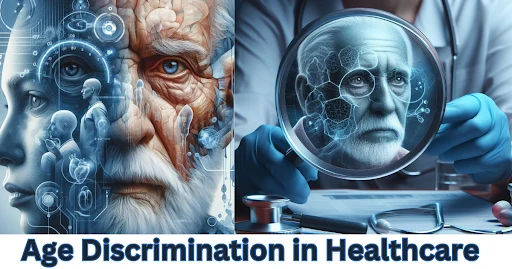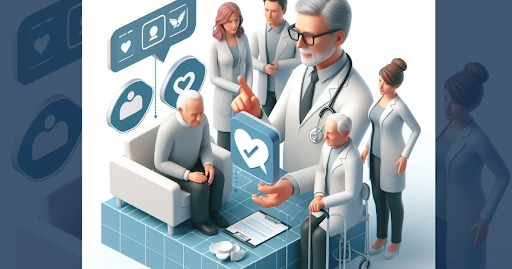Unlocking Progress: Addressing Age Discrimination in Healthcare
In the ever-evolving realm of healthcare, a crucial issue that warrants our focus is the existence of age-related bias within the healthcare system. This article delves into the intricate domain of age discrimination in healthcare, aiming not just to investigate but to shed light on its frequency, repercussions, and the urgent need for substantial reform.

age discrimination 1
Understanding the Scope
The Silent Struggle
Age discrimination in the healthcare sector is a prevalent concern that frequently escapes attention. The older population, in particular, encounters subtle prejudices that can significantly affect the caliber of care they are provided. Ranging from postponed diagnoses to insufficient treatment alternatives, the consequences of age discrimination are extensive and require prompt examination. Navigating the Consequences
Impaired Health Outcomes
The effects of age discrimination reach further than just emotional distress, impacting concrete health results. Postponed interventions, incorrect diagnoses, and restricted treatment alternatives all contribute to a deterioration in the overall health of the elderly. As champions of healthcare, we must recognize these outcomes and work towards a more comprehensive approach, devoid of age discrimination.
Erosion of Trust
Discrimination based on age undermines the trust that serves as the cornerstone of the patient-physician relationship. As older individuals experience feelings of marginalization, trust wanes, impeding open communication and disrupting the collaborative efforts necessary for effective healthcare provision. It is imperative to address age discrimination to rebuild and strengthen trust within the healthcare system.
Advocating for Change
Embracing Inclusivity
Healthcare providers should embrace an inclusive approach that goes beyond age-related stereotypes. By cultivating an environment that appreciates every patient regardless of age, we can break down the barriers that sustain age discrimination in healthcare.
Education as a Catalyst
Education acts as a potent catalyst for instigating change. Introducing extensive training initiatives for healthcare professionals, with a specific emphasis on tackling biases and fostering a culture of empathy, has the potential to reshape the terrain of healthcare delivery. This approach aims to decrease the incidence of age discrimination.
The Role of Technology
Harnessing Innovation
In the era of digital advancements, technology assumes a crucial role in transforming healthcare paradigms. Utilizing inventive solutions like telemedicine and AI-driven diagnostics can effectively alleviate age discrimination by ensuring equal access to state-of-the-art healthcare services.

age discrimination
Bridging the Digital Divide
As we welcome technological progress, it becomes paramount to narrow the digital gap across diverse age groups. Guaranteeing that older individuals possess access to and proficiency in utilizing digital healthcare tools promotes inclusivity and diminishes disparities, thereby effectively decreasing occurrences of age discrimination.
Fostering Cultural Competence
Recognizing Diversity
Promoting cultural proficiency is crucial for addressing age discrimination in healthcare. Healthcare providers can enhance their ability to deliver age-appropriate and culturally sensitive care by acknowledging and comprehending the varied cultural backgrounds of older individuals.
Language as a Barrier
Age discrimination is notably influenced by language barriers. Older individuals from various linguistic backgrounds may encounter difficulties in grasping medical information. It is vital to introduce language access programs in healthcare settings to effectively address this issue and foster equal opportunities for healthcare.
The Importance of Research
Closing Knowledge Gaps
Conducting research plays a pivotal role in tackling age discrimination within the healthcare system. Through the cultivation of a substantial body of evidence, we can pinpoint areas of insufficient knowledge, bring attention to disparities, and formulate focused interventions. This approach is crucial for achieving fair and equitable healthcare outcomes across all age groups.
Collaborative Research Initiatives
Promoting collaborative research endeavors that specifically target healthcare disparities related to age is of utmost importance. By uniting researchers, healthcare professionals, and policymakers, we can instigate meaningful transformations and establish optimal practices to eradicate age discrimination
Empowering Advocacy
Amplifying Voices
Championing for the rights of older individuals proves to be a potent instrument in combating age discrimination within healthcare. Through amplifying the voices of seniors and their advocates, we can heighten awareness, shape policy adjustments, and question entrenched biases within the healthcare system.

age discrimination in healthcare
Grassroots Movements
Backing grassroots movements that advocate for the rights of older individuals is crucial. Initiatives driven by the community can spark transformations at the local level, setting in motion a ripple effect that confronts stereotypes related to age and nurtures a more inclusive healthcare environment.
Collaborative Efforts for Change
Industry Partnerships
Establishing collaboration among healthcare institutions, industry partners, and advocacy groups is crucial to forming a unified front against age discrimination in healthcare. Through nurturing alliances, we can consolidate resources, exchange best practices, and institute comprehensive changes that effectively tackle age-related biases.
Legislative Initiatives
Championing legislative initiatives explicitly targeting age discrimination in healthcare is crucial. Enacting laws and regulations that safeguard the rights of older individuals and penalize discriminatory practices can act as a potent deterrent, ushering in a new era of accountability within the healthcare sector.
The Road Ahead
Policy Reforms
Promoting policy reforms is vital to initiate systemic change. Governments and healthcare institutions should join forces to collaboratively formulate and enforce policies explicitly prohibiting age discrimination in healthcare settings. Establishing a legal framework that safeguards against discrimination sets the stage for a more equitable healthcare system, liberating it from the constraints of age discrimination.
Empowering Patients
Providing patients with knowledge is crucial in breaking down age discrimination. Encouraging health literacy among older individuals empowers them to actively engage in decision-making processes, cultivating a sense of agency and decreasing susceptibility to discriminatory practices, thereby dismantling age discrimination.
Conclusion
The necessity to combat age discrimination in healthcare is ingrained as a foundational duty in our healthcare system. The diverse approach detailed in this thorough examination underscores our dedication to cultivating a healthcare environment that surpasses biases, stereotypes, and discriminatory practices.
Recognizing the quiet challenges experienced by older individuals, embracing technological advancements, promoting cultural understanding, and advocating for legislative changes—all these aspects contribute to the broader story of dismantling age discrimination. The collaborative initiatives highlighted, encompassing industry partnerships and grassroots movements, emphasize the collective dedication essential for bringing about transformative change.
As we move forward, the demand for policy reforms resounds clearly. Governments and healthcare institutions must take firm steps to establish and enforce policies that explicitly forbid age discrimination in healthcare settings. In doing so, we establish the groundwork for a fair healthcare system, liberating it from the constraints of bias and ensuring that every individual receives dignified and unbiased medical care, regardless of age.
Empowering patients with knowledge stands out as a powerful tool in dismantling biases related to age. Encouraging health literacy among older individuals nurtures a sense of control and actively lessens susceptibility to discriminatory practices. This empowerment acts as a catalyst for change, steering a transition toward a healthcare landscape marked by inclusivity, empathy, and equal access.
Essentially, our quest to eliminate age discrimination in healthcare is a joint effort. It requires enduring dedication, united advocacy, and an unwavering pursuit of a healthcare future that champions the principles of justice, fairness, and respect for the dignity of every individual, irrespective of their age.
Like this project
Posted May 19, 2024
Delve into the intricacies of age discrimination in healthcare and join our pursuit of transformative change, cultivating inclusivity for everyone. Unearth the…
Likes
0
Views
2







